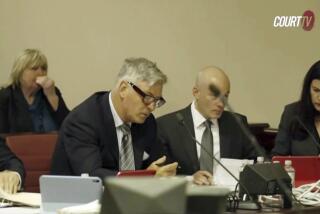Santa Barbara Jury Selection Resumes in Michael Dally Trial
- Share via
SANTA BARBARA — After a three-week hiatus, jury selection continued Monday in the murder trial of Michael Dally as more than a dozen prospective jurors answered questions about their views on the death penalty and various legal issues.
Prosecutors and defense attorneys plan to interview 221 possible jury candidates from Santa Barbara County during the next three weeks. Opening statements in the high-profile murder case are expected to begin Feb. 9.
Dally, 37, is charged with murder, kidnapping and conspiracy for allegedly plotting the killing of his wife, Sherri, with his former girlfriend, Diana Haun. Haun was found guilty of the same charges last year and sentenced to life in prison without possibility of parole.
As in Haun’s trial, a Santa Barbara County jury is being sought for Dally’s because of heavy pretrial publicity in Ventura County.
Before the holidays, lawyers screened more than 500 potential jurors, the majority of whom were excused because of the financial or personal hardships a long trial would create.
On Monday, the next phase of jury selection began as potential jurors deemed able to serve appeared in a small Santa Barbara courtroom for individual interviews. They were questioned by the lawyers and Judge Charles W. Campbell Jr. on a wide range of subjects, including exposure to publicity from Haun’s trial and their willingness to accept various legal concepts.
Of 15 questioned, 10 were excused and five were asked to return for a third phase of questioning Feb. 2. That day, lawyers on both sides will be able to reject candidates for any reason before settling on a panel of 12 jurors and six alternates.
Although prosecutors say Haun was the one who fatally stabbed Sherri Dally in the chest at least 18 times, they believe Michael Dally helped orchestrate the killing.
In probing whether prospective jurors could accept that theory, Deputy Dist. Attys. Lela Henke-Dobroth and Michael K. Frawley asked the panelists if they could follow the law as it pertains to aiding and abetting.
Specifically, they told jury candidates that under the law, a person who instigates or encourages a killing is just as culpable as the person who actually wields the weapon.
One woman, referred to only as “prospective juror No. 8,” told the prosecutors that she does not agree with the concept but would follow legal instructions read by the judge if selected to serve on the case.
Another prospective juror, No. 17, said he could accept such a concept and would ultimately base his decision on the evidence--particularly evidence suggesting motive.
“I think what would matter to me is the intent of the person,” he said.
Much of the questioning focused on the death penalty and the alternate punishment of life in prison without the possibility of parole.
Several jurors said they were philosophically opposed to capital punishment and told the lawyers that under no circumstances could they vote for a death sentence.
“I just can’t be a party to the state’s taking a human life,” said one man, who used to practice law. Now a self-employed legal researcher, he also said he believes strongly in the jury process and would follow the law even if he disagreed with it.
“We are a nation of laws, not men,” said the man, who was asked to return for further questioning.
Others said deciding whether to impose death or life imprisonment would be a gut-wrenching decision but one they could make if the trial were to reach a penalty phase.
If Dally is found guilty of first-degree murder and at least one of two special-circumstance allegations in the case, the same jury would have to decide the punishment.
Defense attorneys Robert I. Schwartz and James M. Farley asked prospective jurors whether they believe in the presumption of innocence or were already leaning toward a guilty verdict given the fact prosecutors have accused their client of committing a crime.
“Mr. Dally has a cloak of innocence that sticks to him throughout the entire trial,” Schwartz said at one point. “Do you think that is the way things should be? Do you think that is a good law?”
The lawyer also asked whether potential jurors would be biased if Dally did not testify during the trial.
“Maybe he will, maybe he won’t,” Schwartz said. “How do you feel about that?”
“Seems right to me,” one prospective juror responded.
More to Read
Sign up for Essential California
The most important California stories and recommendations in your inbox every morning.
You may occasionally receive promotional content from the Los Angeles Times.













